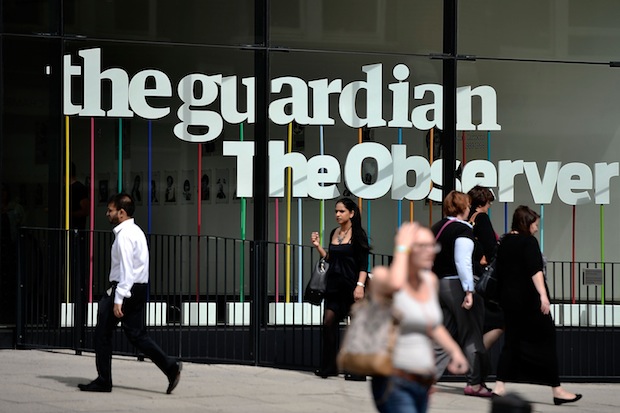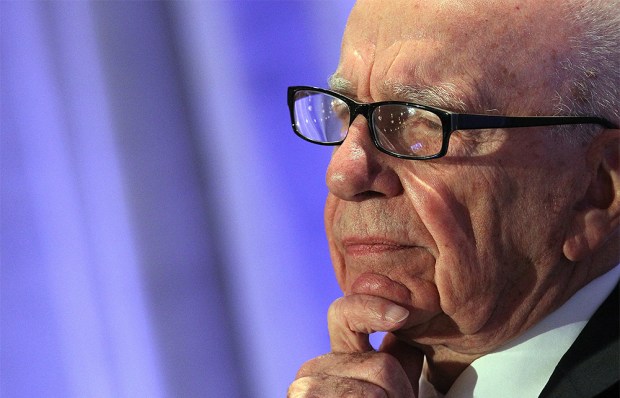It is good to see the Guardian suddenly rediscover its interest in the sanctity of a free press. Just five months ago, the paper seemed to have given up on the idea, when it backed the statutory regulation of newspapers. It did not show any particular alarm when Rupert Murdoch’s journalists were hauled out of bed at 6a.m. and had their computers confiscated while police tried to identify their sources.
But when the Guardian is visited by a civil servant to discuss its possession of secret material concerning British and American intelligence and the partner of one of its journalists is questioned and then released at Heathrow airport, it reacts as if it is the victim of a constitutional outrage. The more we learn about the detention of David Miranda, partner of the Guardian journalist Glenn Greenwald, the more reasonable the government’s actions appear. Miranda was not apprehended simply because of his relationship with Greenwald, as originally suggested. He was part of a professional operation leaking classified information which betrayed British and American national security. That betrayal comes from a source — Edward Snowden — currently granted asylum in Moscow.
Despite initial attempts to portray Miranda as an innocent, it transpires that he was carrying encrypted files from Snowden to Greenwald. It was only after its initial outcry that the Guardian admitted that it had paid for the airline tickets on which Miranda was travelling. So are we really supposed to be outraged that the police should be interested in these goings-on?
Britain is engaged in a fight against terrorism — a fight that we are winning, thanks to the diligence and flair of our security services. They occupy the difficult territory between freedom and liberty: the British government has to strike a balance between the two. It is for ministers to decide which details ought to be in the public domain, and which ought to be kept secret so that we can better intercept terrorists. Over recent years it has been decided by sections of the media that it is in fact their role, not that of elected, accountable officials, to perform this task.
The notion that the British government has the right to keep secrets is widely accepted. Of course, journalists will seek to expose these secrets if they believe it is in the public interest. But it is not quite clear that the Guardian is doing so in this case. Greenwald certainly speaks as if he is waging a kind of information jihad against the British government. ‘I will be far more aggressive in my reporting from now. I am going to publish many more documents,’ he declared after his partner was detained. ‘I have many documents on England’s spy system. I think they will be sorry for what they did.’
This does not sound much like a journalist. Rather, it sounds like a saboteur with a very particular agenda. It shouldn’t require his source to be based in a Philby-esque hideaway for people to be alert to this.
All of which raises fresh questions about what exactly the Guardian wants to achieve. Alan Rusbridger, its editor, seems outraged that he was visited by Sir Jeremy Heywood, the cabinet secretary, who sought to underline the risk to Britain and its fight against terrorism by the disclosure of further secrets. The government chose not to raid, arrest or injunct — although it had the power to do all three. To suggest that sending Sir Jeremy was the act of an authoritarian state is not only a hysterical exaggeration. It is also a grave insult to those who do live under such regimes.
When David Cameron’s government proposed to bring back state licensing of the press, this magazine said it would boycott any such regulator no matter what the consequences. We do not remember Mr Rusbridger rushing to support us. He seems to have a rather different test for press freedom: whatever suits his newspaper the best. The Leveson report, and the notion of allowing politicians to set the parameters in which the press can operate, seemed to be quite acceptable to him: after all, it would hurt his rivals the most.
Of course, we are sure to be able to look forward to the Guardian calling for a public inquiry after the next terrorist atrocity occurs. ‘Why did the security services not know about this?’ they will ask once again. ‘Why was there no heads-up or advance warning?’ One reason will be because Messrs Assange, Snowden, Greenwald and others have done so much of late — ably assisted by the Guardian — to try to make those same intelligence services operationally incapable.
Press freedom is indeed under threat in Britain. The Guardian, for all of its proud history, has proven a rather unreliable defender of these freedoms in recent years — especially when it has spotted an opportunity to sock it to Rupert Murdoch. There is a growing case for a British Bill of Rights that would define and protect press freedom for the digital age, giving us the same protections that the Americans are afforded by the First Amendment. But there is not, and never has been, a fundamental right for newspapers to acquire and publish state secrets that weaken our national security and put the country at risk. Any ally of press freedom ought to be able to make this distinction.
Got something to add? Join the discussion and comment below.
Get 10 issues for just $10
Subscribe to The Spectator Australia today for the next 10 magazine issues, plus full online access, for just $10.
You might disagree with half of it, but you’ll enjoy reading all of it. Try your first month for free, then just $2 a week for the remainder of your first year.














Comments
Don't miss out
Join the conversation with other Spectator Australia readers. Subscribe to leave a comment.
SUBSCRIBEAlready a subscriber? Log in